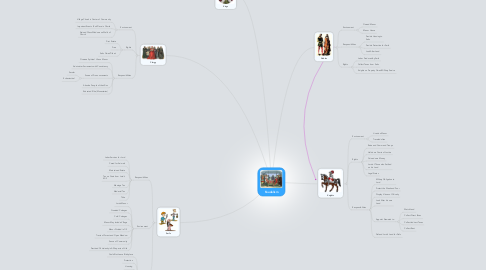
1. Kings
2. Serfs
2.1. Responsibilites
2.1.1. Labor Services for Lord
2.1.2. Cared for Animals
2.1.3. Maintained Estate
2.1.4. Tax on Grain from Lord's Mill
2.1.5. Marriage Tax
2.1.6. Medevial Tax
2.1.7. Tithe
2.2. Environment
2.2.1. Lords Manor
2.2.2. Crowded Cottages
2.2.3. Cold Cottages
2.2.4. Manor May Include Village
2.2.5. Manor Divided in 1/2
2.2.6. Tracts of Forest and Open Meadow
2.2.7. Sense of Community
2.2.8. Practiced Christianity in All Aspects of Life
2.3. Rights
2.3.1. Could Not Leave Birthplace
2.3.2. Protection
2.3.3. Housing
2.3.4. Rent Land for Period of Time
2.3.5. Potential Freedom (As Time Progressed)
2.3.6. Support in Times of Trouble
3. Clergy
3.1. Environment
3.1.1. Village Church is Center of Community
3.1.2. Important Events Took Place in Church
3.1.3. Stained Glass WIndows on Walls of Church
3.2. Rights
3.2.1. First Estate
3.2.2. Free
3.2.3. Serfs Owed Tithe's
3.3. Responsibilities
3.3.1. Oversee Spiritual Life on Manor
3.3.2. Administer Sacraments with Consistency
3.3.3. Source of Pronouncements
3.3.3.1. Secular
3.3.3.2. Ecclesiastical
3.3.4. Absolve People of their Sins
3.3.5. Educated Elite (Monasteries)
4. Nobles
4.1. Environment
4.1.1. Owned Manor
4.1.2. Manor House
4.2. Responsiblities
4.2.1. Provide Housing to Serfs
4.2.2. Provide Protection for Serfs
4.2.3. Look After Land
4.3. Rights
4.3.1. Labor Produced by Serfs
4.3.2. Collect Taxes from Serfs
4.3.3. Knights on Property Owed Millitary Service
5. Knights
5.1. Environment
5.1.1. Lived on Manor
5.1.2. Traveled often
5.2. Rights
5.2.1. Raise and Command Troops
5.2.2. Held own Courts of Justice
5.2.3. Coined own Money
5.2.4. Lord of Those who Settled on his Land
5.2.5. Legal Status
5.3. Responsibilities
5.3.1. Military Obligation to Lord
5.3.2. Protect the Weak and Poor
5.3.3. Display Virtues of Chivalry
5.3.4. Look After his own Land
5.3.5. Appoint Stewards to:
5.3.5.1. Watch Land
5.3.5.2. Collect Direct Taxes
5.3.5.3. Collect Indirect Taxes
5.3.5.4. Collect Rent
5.3.6. Defend Lord's Land for Fiefs
